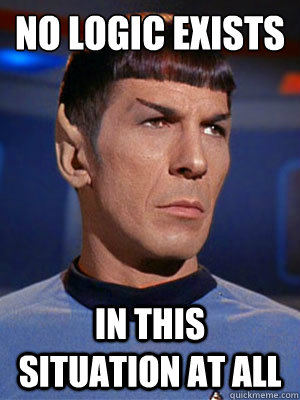Stories
One of the greatest mistakes you can make, when looking at people, is to assume that we are a rational, logical species. (I, myself have made this mistake on a few occasions). This assertion doesn’t hold up to the slightest bit of scrutiny (insert scathing political satire here). Anyone who holds to this viewpoint is doomed to a painful, confusing and frustrating experience when dealing with other humans. A different perspective to consider, for those Vulcan types, is to focus on humans not as rational, intelligent, logical beings but as storytellers.

Humans love stories. Fictitious tales exist in every single culture on the planet that has language (probably). From the great tradition of epic tales pass through the generation to the stories told in the lyrics of music, to the stories in our graphic novels, all the way down to the stories we create when we’re playing games. Yes, even when we’re playing card games (Living, Collectable or otherwise), we’re building a story together. These narratives, great and small, define us in the microcosm and guide us in the macrocosm.
Within the great parables of the Bible, of Gilgamesh, of Homer, etc., are the stories meant to help people align their morality and psychology to that of their society. While they contain a few codified “Thou Shalt”s and “Thou Shalt Not”s, they contain countless more “Thou Probably Oughta”s and “Thou Might Rethink Things Before Continuing Down That Path”s hidden in the stories of the characters within. We love our stories and we usually prefer to learn from them instead of boring rote memorization or lists. Consider how many of us have delightful stories of our times in college, but not so many of the dry facts and figures.

One of the reasons those stories last forever while the details are lost is that we can relate to a story far better. We can empathize with Odysseus and his pride and his mistakes and his cleverness. We can understand the isolation and fear of a mutant in the x-men because we have felt teenage ennui and angst before. We can experience the familiar pang of loss and despair during the saddest of dirges because that’s something we’ve all gone through. This relatability is what allows us to reach back across the generations as well as out into the future and connect with humanity indefinitely.

Still works better than whatever these are. Seriously, is it like the hobo signs for aliens?
It’s also one of our biggest frustrations in life, in that we have a deep need to be involved in a narrative. We also often feel the need to be at the very center of the story, as well. All of a sudden, the details of events are only important as they relate to the story. The accuracy of them only matters if there’s someone else who might have a conflicting account and, even then, they can often be explained away with, surprise, more story!

And so finally, we arrive back at the initial assertion of this article: people like stories. If you consider the angle that any given person is more interested in telling a story than in reciting facts, you’ll have a better shot at understanding people. If you can accept that people’s perspective is that of the hero of their own epic tale, where everything that’s happening is, at least partially, related to them, then their attitudes become less insane and more understandable. Once you can start to comprehend someone’s narrative, who they are in their own story, you can start to see that their actions make perfect sense in that world.
Next time, more on narratives vs logic, preference vs reason and circumstances being either a justification, an excuse or completely ignored depending on your perspective.
-Kendric
